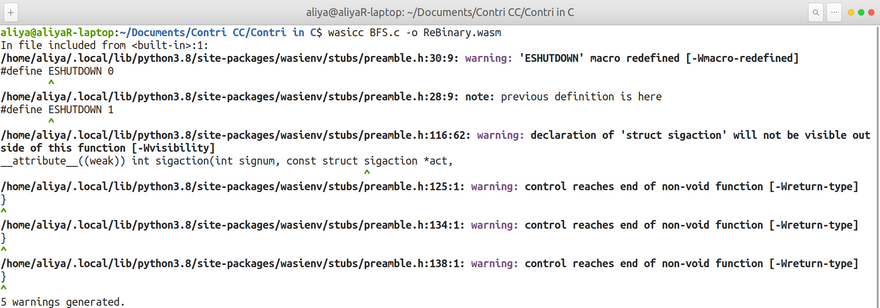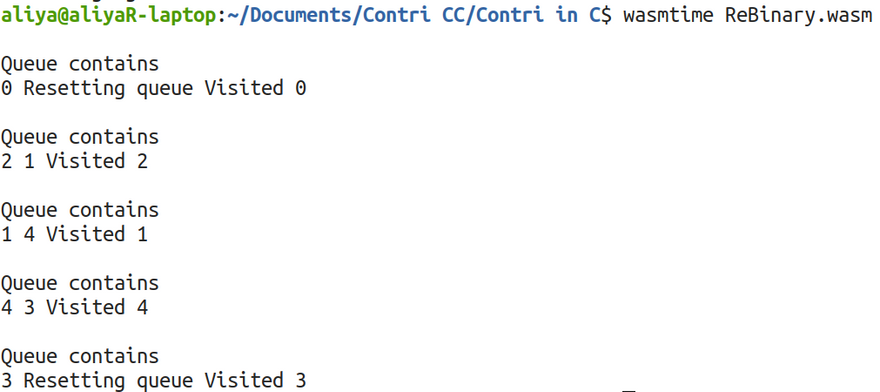OUTREACHY CONTRIBUTION SERIES:
In this blog, we'll be compiling and executing Breadth First Search(BFS) algorithm in C using wasmtime.
Some tools required for the program to run:
1. Install C/Cpp compiler
gcc -v
make -v
2. Install Wasmer
$ curl https://get.wasmer.io -sSfL | sh
3. Install Wasienv
curl https://raw.githubusercontent.com/wasienv/wasienv/master/install.sh | sh
wasmtime ReBinary.wasm
4. Install Wasmtime
$ curl https://wasmtime.dev/install.sh -sSf | bash
$ wasienv install-sdk unstable
Compiling BFS Algorithm in C
Create a file named BFS.c and add the following BFS code to it:
#include <stdio.h>
#include <stdlib.h>
#define SIZE 40
struct queue {
int items[SIZE];
int front;
int rear;
};
struct queue* createQueue();
void enqueue(struct queue* q, int);
int dequeue(struct queue* q);
void display(struct queue* q);
int isEmpty(struct queue* q);
void printQueue(struct queue* q);
struct node {
int vertex;
struct node* next;
};
struct node* createNode(int);
struct Graph {
int numVertices;
struct node** adjLists;
int* visited;
};
void bfs(struct Graph* graph, int startVertex) {
struct queue* q = createQueue();
graph->visited[startVertex] = 1;
enqueue(q, startVertex);
while (!isEmpty(q)) {
printQueue(q);
int currentVertex = dequeue(q);
printf("Visited %d\n", currentVertex);
struct node* temp = graph->adjLists[currentVertex];
while (temp) {
int adjVertex = temp->vertex;
if (graph->visited[adjVertex] == 0) {
graph->visited[adjVertex] = 1;
enqueue(q, adjVertex);
}
temp = temp->next;
}
}
}
struct node* createNode(int v) {
struct node* newNode = malloc(sizeof(struct node));
newNode->vertex = v;
newNode->next = NULL;
return newNode;
}
struct Graph* createGraph(int vertices) {
struct Graph* graph = malloc(sizeof(struct Graph));
graph->numVertices = vertices;
graph->adjLists = malloc(vertices * sizeof(struct node*));
graph->visited = malloc(vertices * sizeof(int));
int i;
for (i = 0; i < vertices; i++) {
graph->adjLists[i] = NULL;
graph->visited[i] = 0;
}
return graph;
}
void addEdge(struct Graph* graph, int src, int dest) {
struct node* newNode = createNode(dest);
newNode->next = graph->adjLists[src];
graph->adjLists[src] = newNode;
newNode = createNode(src);
newNode->next = graph->adjLists[dest];
graph->adjLists[dest] = newNode;
}
struct queue* createQueue() {
struct queue* q = malloc(sizeof(struct queue));
q->front = -1;
q->rear = -1;
return q;
}
int isEmpty(struct queue* q) {
if (q->rear == -1)
return 1;
else
return 0;
}
void enqueue(struct queue* q, int value) {
if (q->rear == SIZE - 1)
printf("\nQueue is Full!!");
else {
if (q->front == -1)
q->front = 0;
q->rear++;
q->items[q->rear] = value;
}
}
int dequeue(struct queue* q) {
int item;
if (isEmpty(q)) {
printf("Queue is empty");
item = -1;
} else {
item = q->items[q->front];
q->front++;
if (q->front > q->rear) {
printf("Resetting queue ");
q->front = q->rear = -1;
}
}
return item;
}
void printQueue(struct queue* q) {
int i = q->front;
if (isEmpty(q)) {
printf("Queue is empty");
} else {
printf("\nQueue contains \n");
for (i = q->front; i < q->rear + 1; i++) {
printf("%d ", q->items[i]);
}
}
}
int main() {
struct Graph* graph = createGraph(6);
addEdge(graph, 0, 1);
addEdge(graph, 0, 2);
addEdge(graph, 1, 2);
addEdge(graph, 1, 4);
addEdge(graph, 1, 3);
addEdge(graph, 2, 4);
addEdge(graph, 3, 4);
bfs(graph, 0);
return 0;
}
Compile C code using wasicc:
$ wasicc BFS.c -o ReBinary.wasm
Run the program:
$ wasmtime ReBinary.wasm
Hope you enjoyed!







Top comments (0)